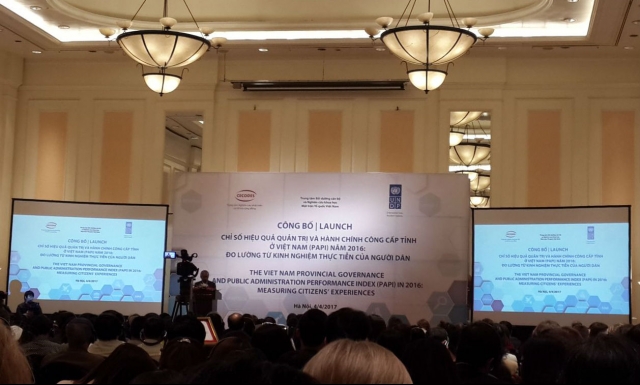While recognizing positive trends in public service delivery, the 2016 PAPI (Public Administration Performance Index) Report released by United Nations Development Program (UNDP) indicated that the declining control of corruption in the public sector continued last year.

The Index pointed out noticeable spikes in the number of respondents saying they had to pay bribes to obtain State employment, for land use right certificates, and for teachers to pay sufficient attention to their children in public primary schools.
Some 54 per cent of respondents paid bribes in order to secure a government job, up from 51 per cent in 2015 and 46 per cent in 2011.
On a more positive note, fewer respondents in 2016 said bribery was needed to access public healthcare at the district level.
Of the six dimensions measured in 2016, the greatest gain was seen in public service delivery, with 35 provinces improving their scores in 2016 compared to 2011.
In particular, citizens’ perceptions of public health surged due to a jump in the proportion of people with health insurance, from 62 per cent in 2015 to 73 per cent in 2016.
There was also a significant rise in the reported quality of free child healthcare, with 32 per cent saying that services for children under 6 years old were excellent compared to 23 per cent in 2015.
According to Mr. Kamal Malhotra, UN Resident Coordinator and UNDP Resident Representative in Vietnam, the 2016 PAPI results paint a mixed picture.
One the hand, there has been a steady improvement in the performance of public service delivery over the past six years.
“However, most provinces can do more to improve the competence and attitude of civil servants and public employees, and enhance the transparency, responsiveness, and accountability of their institutions,” he said.
2016 witnessed a 10 per cent increase compared to 2015 in the number of respondents saying the environment was the issue of greatest concern.
This is likely related to the widespread reporting on the mass fish deaths along the central and north-central coasts from April 2016 onwards, though the survey also reveals concerns about increasing air and water pollution in many parts of the country.
More than 67 per cent of surveyed citizens reported that water quality has deteriorated in the past three years, and 36 per cent reported a decline in air quality.
The PAPI 2016 looked at overall provincial performance. Among the best performers were the northern provinces of Phu Tho, Hai Duong, Bac Ninh, Bac Giang, Nam Dinh, Thai Binh, Hung Yen, and Ninh Binh, the north-central and central coastal provinces of Ha Tinh, Quang Tri, and Da Nang, and the Mekong Delta cities and provinces of Can Tho, Ben Tre and Dong Thap.
Nam Dinh, Ha Tinh, Quang Tri and Da Nang have maintained their overall best performance status for six years in a row.
Conducted by the UNDP and the Center for Community Support Development Studies, the report surveyed 14,000 random citizens selected from all of Vietnam’s 63 cities and provinces.
It assessed citizens’ experiences with national and local government performance in governance, public administration, and public service delivery.
VN Economic Times